Salem's Farm, Mahdah
Salem's Farm, Mahdah
Salem is a young Emirati who has assumed responsibility for the family farm,
near Mahdah. He has generously invited members of the Al Ain chapter of the ENHG
to visit his farm at any time to see a typical farming operation.
Salem has many memories of time spent on the farm during his youth. His
father used camel caravans to ship dates harvested on the farm and charcoal
produced nearby to the market in Dubai. On the return trip, the caravan brought
dried fish and other supplies from the coast to the interior.
At Salem's invitation, the Al Ain chapter of the ENHG has begun a process to
tag individual trees and plants so that members and their families may visit the
farm and enjoy the work of Salem and his family. Salem, who has a full-time job
in the Emirates, has collected plants from as far away as the Lebanon and
Salalah in Oman to add to his collection. He has invited ENHG members to visit
the farm any time. The Al Ain chapter acknowledges and very much appreciates his
generosity.
Salem's farm is typical of many regional farms but is unique because Salem
has included some plants not found on farms here. In fact, he has traveled from
Salalah to Lebanon in search of new and interesting plants.
Members of the Al Ain chapter have visited the farm and attached small labels
to many of the plants. Each label shows the plant's scientific name, its common
English and Arabic names, and the country of origin. Only the fig is native to
this part of the world, for example.
Members are invited to visit the farm at any time. Salem suggests the farm is
an ideal location for a Friday picnic.
To display each photo, click on the small photo or the text below each photo.
Photos in this gallery were taken by Phil Iddison during an ENHG field trip
to the farm 5 June 2000.
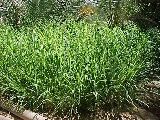
Rhodes grass |
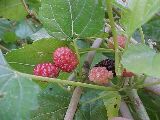
Mulberries on one of the mulberry trees. |

Flower of one of the plantain plants. There are three varieties of
"bananas" on the farm. |
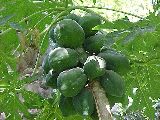
A cluster of papayas ripening near the pumphouse. |
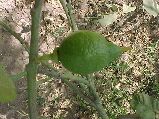
An immature lemon. There are several varieties of lemon as well as a variety
of lime trees. The nub at the base of the lemon is an easy method to
distinguish an immature lemon from a lime. The leaves of the trees are also
dissimilar. |

The farm, in operation for several generations, is located in the foothills
of the Hajjar Mountains and only a few kilometers from Wadi Suwaymi. |

There are many varieties of dates on the farm. These immature dates (Khalal
stage) are sometimes harvested and pickled. In the past, dates from the farm
were shipped to Dubai, along with charcoal, via camel caravan. |
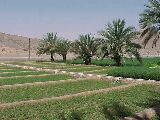
Alfalfa is a popular cash crop for farmers. On Salem's farm, the alfalfa is
harvested and taken to Dubai. Behind the small hills in the distance is the
route up Wadi Sumayni to Dubai or the Madam Plain. |
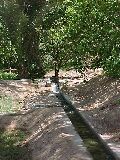
The traditional system of flooding small areas of the farm is still used,
though it is considered much less efficient than sprinkler and drip
irrigation systems. Water channels, known as aflaj or fallaj, have been used
for centuries to carry water from wells or from streams in the mountains.
Some aflaj are several kilometers long and date back more than 3000 years. |
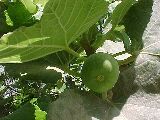
The fig is one of the more common plants in the region. |
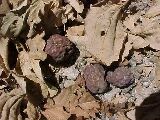
Not all farm produce has a ready market these days. The ground is littered
with nabak fruit in one location after the fruit was not harvested. The trees
are scheduled to be removed and replaced with mango trees. |
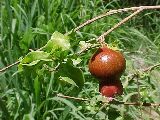
An immature pomegranate. Salem is keen to experiment with different fruit
trees and has even brought coconut palms from southern Oman to the farm;
however, the trees are not likely to bear fruit. |

In addition to the fruit trees, there are fields of alfalfa, onions and
tomatoes. Goats and sheep are also raised. Here a farm worker is harvesting
tomatoes. |
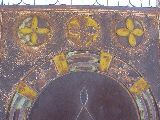
In the traditional style, the farm is surrounded by a low wall. The entrance
features a decorative gate. |
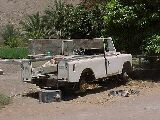
This Land Rover is now evidently assigned as a source of spare parts. |
|














